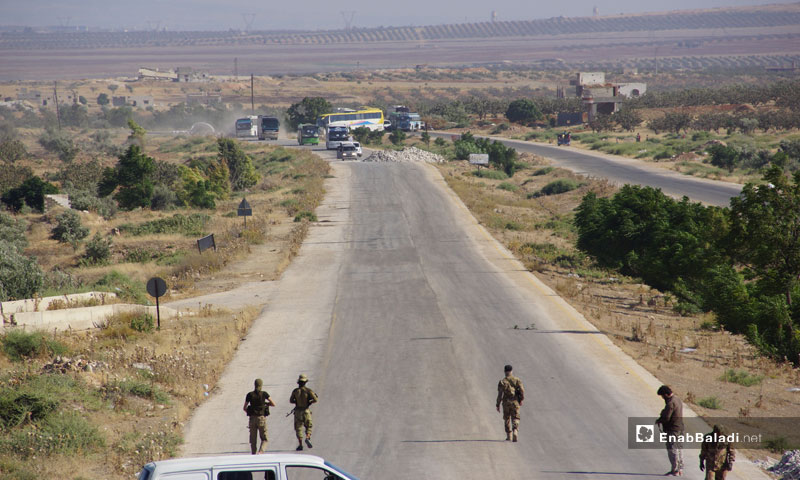“I contacted with a number of bus drivers; one of them asked for a sum of 20 thousand Syrian pounds. I resorted to another, who demanded 45 thousand pounds ($100), knowing that the bus can accommodate more than 45 passengers.”
This is what “Abu al-Nour,” who refused to reveal his name, told Enab Baladi, and he is one of the passengers forced to travel back and forth to the city of Hama to get his salary.
“I have not received my salary for three months for both the crossings, Murak and Qalaat al-Madiq, were closed. When the Murak crossing was reopened, I head to get my salary from the city of Hama, now controlled by the Syrian regime, to be surprised with the massive increases in the transportation fee, the equivalent to a month’s salary,” said “Abu al-Nour”.
He spoke of the drivers’ exploitation of the passengers’ need, “on the allegation that they are paying money to the regime’s checkpoints,” pointing out that the duration spent by passengers on the way from the city of Murak to Hama governorate is more than four hours, which is long, due to inspection and accurate investigation on the part of the regime’s checkpoints.
Ten Thousand Syrian Pounds, a Royalty Demanded for Each Passenger
The bus drivers attributed the high fair to the fees imposed by the Assad’s forces at the checkpoints, erected on the International Highway, though the distance between Murak and the city of Hama is no more than 30 kilometers.
One of the drivers told Enab Baladi, refusing to reveal his name for security reasons, that “the increase in the fair demanded for the transportation of each passenger from the city of Murak to that of Hama is about 20 thousand Syrian pounds (about $40) is due to the royalties imposed by the regime’s checkpoints. The first checkpoint, near the city of Suran, takes ten thousand pounds, while three other checkpoints take two thousand each as a fee per passenger.”
The driver confirmed to Enab Baladi that he pays 450 thousand SP ($1000), one time, as a fee for a whole year, to the checkpoint which consists of the 4th Division troops and Air Force Intelligence, located at the entrance to the city of Hama.
He added that he is then forced to pay 200 thousand SP as an annual fee, given to each checkpoint.
Who Runs the Crossing?
Following the reopening of the “Murak” crossing, northern rural Hama, for trade and transportation between the opposition held areas and those controlled by the regime on November 2th, the activities of exist and entry went back to normal, after the crossing was closed for three months by the Russian police.
The crossing is run by the “Hay’at Tahrir al-Sham” (HTS), which it established as a link with the areas controlled by the Syrian regime in November 2017, after it took over the village of Abu Dali, eastern Hama, which was immediately recaptured by the Assad’s forces.
The reopening of the crossing came two months after the signing of the Idlib deal between Russia and Turkey, providing for the establishment of a demilitarized zone between the areas controlled by the opposition and those under the Syrian regime’s rule.
The Murak crossing is within the borders of the demilitarized zone, agreed to have a width of 20 kilometers, along the confrontation lines between the opposition and the Syrian regime.
The Murak crossing is located in the northern rural parts of Hama, and it was opened as a substitute for the crossing at the Abu Dali village, which the Assad’s forces has lately controlled.
Last August, the Russian police shut the crossing down entirely, in addition to the Qalaat al-Madiq, which, back then, corresponded to the arrival of Assad’s forces’ reinforcement in the surrounding of Idlib.
The Idlib deal, between Russia and Turkey, conducted last September, provided for the reopening of the two international highways, Damascus-Aleppo and Latakia- Aleppo, M4 and M5.
According to the Turkish announcement, stated by the Turkish Minister of Foreign Affairs Mevlüt Çavuşoğlu, this operation is to be implemented before the end of 2018.











